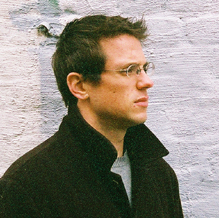 Saturday, April 02, 2005
Saturday, April 02, 2005
Midgette's Mystery
Last Sunday's New York Times is still providing grist for the mill. While everyone was busy salivating over the Wuorinen-Harbison-Levine summit, they might have missed another important piece. Anne Midgette's article about how classical musicians' plots to educate their audiences usually fall short makes some good points:
Too often, all those notes and lectures and, yes, even the concert hall itself effectively create an additional barrier, making the concert experience feel more like a college class than an evening of enjoyment. The idea being that the more an audience knows about the music they're listening to, the more they will appreciate it. Well, that's usually not the case. And Ms. Midgette sites as evidence the fact that she routinely sees people looking at the wrong program in the playbill during a concert.
The fact that some musicians and musical organizations feel the need to lecture their audiences and extoll the virtues of some work or another, although extremely well-intentioned, only serves to reinforce the idea in some of the public's mind that classical music is an elitist institution. I imagine that some audience members would be put off by a pre-concert lecture--as if they were being talked down to. Ms. Midgette's right: who wants to be lectured to when you've come to enjoy some live music?
Like Ms. Midgette, I've often thought of the concert hall as something of a barrier. The performer has a role to fulfill as does the audience. Maybe lecturing to the audience isn't the best way to try and break down that barrier. Some artists have enjoyed great success taking classical music out of the concert hall and into some pretty seedy places. The cellist Matt Haimovitz has perhaps done this the best of anyone recently. He's toured around the country with all six of Bach's cello suites and a more contemporary program called Anthem, which includes some newly commissioned works, in venues that might seem less than accommodating to his instrument--coffeehouses and rock clubs.
Classical musicians are trying to reach out to new audiences. Who can blame them? It's something that I'm certainly actively involved in. If we're going to succeed, I think Mr. Haimovitz provides the best model. And he does it without sacrificing any of his artistic integrity. So keep the lectures to five sentences or less and fill up the time with imaginative programming and compelling performances. People will respond.
posted by Brian Sacawa
12:29 PM
|
|
 Praised by The New York Times as "an inventive musician . . . fresh and surprising," saxophonist Brian Sacawa has firmly established himself as an important contemporary voice for his instrument. He is active as a soloist, recitalist, and chamber musician throughout the United States and is the co-founder of the new music duo Non-Zero with percussionist Timothy Feeney.
Praised by The New York Times as "an inventive musician . . . fresh and surprising," saxophonist Brian Sacawa has firmly established himself as an important contemporary voice for his instrument. He is active as a soloist, recitalist, and chamber musician throughout the United States and is the co-founder of the new music duo Non-Zero with percussionist Timothy Feeney.
He has given premieres of over thirty works by both established and emerging composers, including Michael Gordon, Bright Sheng, Andrew Mead, Oliver Schneller, Ken Ueno, Beata Moon, Hillary Zipper, and Scott McAllister, among many others. Named the Baltimore CITYPAPER’s Critic’s Choice for Classical Music in 2002, he is the recipient of awards for solo performance from both national and international competitions.
Sacawa's versatile career has led to appearances with the St. Petersburg Philharmonic, the Detroit Symphony Orchestra, the New World Symphony, Harvard Group for New Music, New Music Brandeis, Bargemusic, and at meetings of the ISU Contemporary Music Festival, World Saxophone Congress, North American Saxophone Alliance, and New England Saxophone Symposium.
Brian holds degrees from the University of Michigan, the Peabody Conservatory, and the University of Massachusetts – Amherst, where he studied with Donald Sinta, Gary Louie, and Lynn Klock. He has recorded for the Equililbrium, Naxos, and BiBimBop recording labels.
See Brian's other blog
Sounds Like Now
| |



